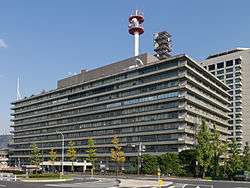Japan Tourism Agency
The Japan Tourism Agency (観光庁, Kankō-chō), JTA, is an organization which was set up on October 1, 2008 as an agency of the Ministry of Land, Infrastructure, Transport and Tourism.[4]
| 観光庁 Kankō-chō | |
 | |
 Joint Government Building No.3 | |
| Agency overview | |
|---|---|
| Formed | October 1, 2008[1] |
| Jurisdiction | |
| Headquarters | Yubinbango 100-8918, Chiyoda-ku, Kasumigaseki 2-chome No. 1 No. 3, Tokyo |
| Employees | 200[2] |
| Annual budget | ¥26,438 million JPY[3] |
| Agency executives |
|
| Parent agency | Ministry of Land, Infrastructure, Transport and Tourism |
| Website | http://www.mlit.go.jp/kankocho/en/ |
Background of establishment
Japan Tourism Agency seated itself with intentions to stimulate local economies and to further international mutual understanding,[5] following legislation of Basic Act on Promotion of Tourism Nation (in December 2006, to wholly revise Tourism Basic Act),[6][7] committee resolutions in both Houses of the Diet in the legislation process,[8][9] and decision at a Cabinet meeting of Basic Plan (in June 2007)[10][11] which was drawn as provided by the Basic Act. One legal basis of the Agency is Act for Establishment of the Ministry of Land, Infrastructure, Transport and Tourism.[4]
The two committee resolutions (of almost the same contents) are made by the Committee on Land and Transport of each House of the Diet, to point out eight issues on which the government should take appropriate measures when it enforces the Basic Act. In the issue No. 8 it was stated that the government should make efforts to set up tourism agency or so.
In the Basic Plan, five fundamental targets are set, whose substances are, respectively, to increase the number of:
- a. foreign tourists visiting Japan;
- b. international meetings held in Japan;
- c. nights for stay in accommodations per one Japanese during domestic sightseeing tours;
- d. Japanese tourists to overseas;
- e. expenditure in Japan on sightseeing tours.
All the five targets each have numerical value. Many among the total of 25 various targets each have some numerical value.
Departments
- General Affairs Division
- Tourism Industry Division
- International Tourism Policy Division
- International Exchange Promotion Division
- Tourism Area Promotion Department
Notes
- "Opening Doors" (PDF), Highlighting JAPAN, 9 (2), p. 8, 2009, archived from the original (PDF) on 2013-01-20.
- 国土交通省定員規則 (in Japanese)
- 財務省, Ministry of Finance. (in Japanese)
- 国土交通省設置法 Archived 2012-02-15 at the Wayback Machine, Ministry of Internal Affairs and Communications. (in Japanese)
- 「観光庁の新設(平成20年10月)について」 Archived 2008-10-10 at the Wayback Machine, Ministry of Land, Infrastructure, Transport and Tourism. Retrieved on 2008-09-23. (in Japanese)
- 観光立国推進基本法, Ministry of Internal Affairs and Communications. (in Japanese)
- 議案審議情報 Archived 2008-10-25 at the Wayback Machine, House of Councillors. Retrieved on 2008-09-29. (in Japanese)
- 会議録「第165回国会 国土交通委員会 第8号(平成18年12月6日(水曜日))」 Archived 2011-07-25 at the Wayback Machine, House of Representatives. Retrieved on 2008-09-23. (in Japanese)
- 観光立国推進基本法案に対する附帯決議 平成十八年十二月十二日 参議院国土交通委員会, House of Councillors. Retrieved on 2008-09-23. (in Japanese)
- 「観光立国推進基本計画」, Ministry of Land, Infrastructure, Transport and Tourism. (in Japanese)
- 観光立国推進基本計画 Archived 2007-12-27 at the Wayback Machine, Ministry of Land, Infrastructure, Transport and Tourism. (in Japanese)